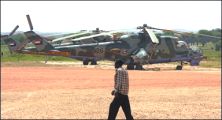Sudanese offensive throws Darfur peace initiative into turmoil
ABUJA, Dec 18 (AFP) — Sudan threw the African Union’s plan to restore peace to Darfur into turmoil, engaging in a fresh battle with rebel forces and defying an international demand that it halt its offensive, officials said.

|
|
Two Sudanese military helicopters at Elgeneina airport (AFP). |
As helicopter gunships raided the rebel-held community of Labado in the south of the disputed Sudanese region, AU officials signalled that the already stalled Abuja peace conference would likely be suspended on Sunday.
Khartoum’s decision marked a severe blow to the African Union’s latest bid to resolve a regional crisis without broader international intervention and increased the likelihood that the United Nations will be asked to take action.
AU spokesman Assane Ba said the 53-nation body’s chairman President Olusegun Obasanjo of Nigeria and the head of the AU commission Alpha Oumar Konare would be informed of the clashes and take a decision on the future of the talks.
He said international observers at the stalled Abuja peace conference on Darfur had been told by the commander of the AU observer force in the region, General Festus Okonkwo, that fighting had erupted as the deadline approached.
“General Okonkwo informed us that there is some fighting going on around Labado (in southern Darfur) which means that the government did not comply with the ultimatum to withdraw its troops from Labado,” he told reporters.
“General Okonkwo said he has spoken with his mission on the ground and said that up until now helicopters are firing on Labado,” he added. This information was correct at 1730 GMT, 30 minutes after the AU ultimatum expired, he said.
“It’s not up to us at our level here to take a decision. We will inform the leadership of the African Union … what is going on,” he said.
Ba said that mediators would meet on Sunday to discuss the situation with the delegates to the Abuja talks, but AU diplomats had earlier signalled that if Khartoum refused to withdraw its forces then the talks would be going nowhere.
Rebel negotiators have been insisting since Tuesday that they will not sit down with the government while its two-week-old offensive, which was launched in breach of an April ceasefire deal signed in the Chadian capital Ndjamena, continues.
But Sudan has remained defiant, despite an 11th-hour appeal from Konare for its forces “to immediately stop its present military offensive and withdraw its forces to their former positions” in order to save the peace initiative.
“The chairperson reiterates the undertaking by the AU commission to bring any serious violation to the attention of the AU Peace and Security Council and the UN Security Council,” warned a statement from AU headquarters.
In Khartoum, Sudanese Foreign Minister Mustafa Osman Ismail was dismissive.
“How come the government troops (should) withdraw from those positions so long as they are responsible for maintenance of peace and stability in the region?” he asked reporters in Khartoum when told about the AU demand.
While in Abuja, Ismail’s deputy, Minister of State Najeib Abdelwahab, insisted that government forces had every right to be in Labado and that their operation there had ended in line with the AU’s request.
“We’ve fully complied with the appeal made by the African Union,” he said.
But the rebels were unconvinced, and whether or not the African Union decides to wind up the talks, reiterated that they would not take part in any discussions with the government side until the troops are pulled back.
On Friday, Okonkwo had told international observers at the talks that in the offensive the Sudanese army and its ally, the Janjaweed militia, had attacked two rebel areas and burned down and looted eight villages.
Darfur has been the scene of major conflict since February last year, when two rebel movements launched a revolt against Khartoum, claiming that the Arab-led government had marginalised and persecuted the region’s black African tribes.
In the subsequent crackdown pro-government militias have attacked black communities, murdering and raping tens of thousands of civilians and driving more than 1.6 million from their homes, according to the United Nations.
